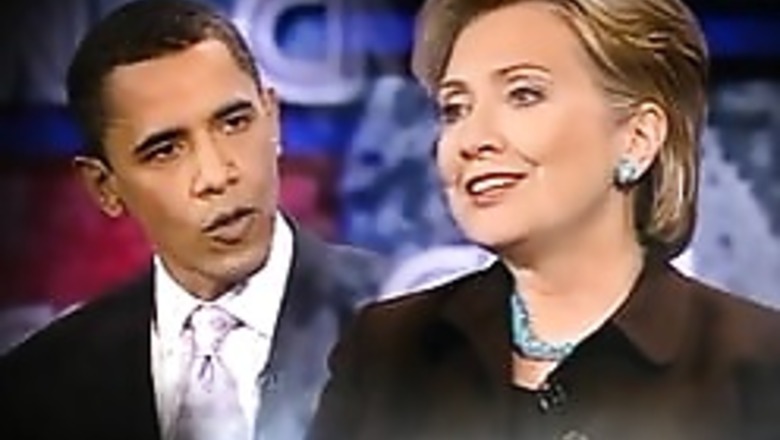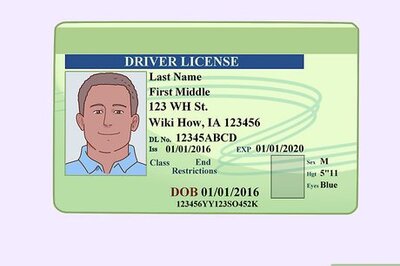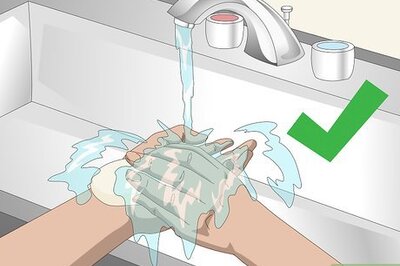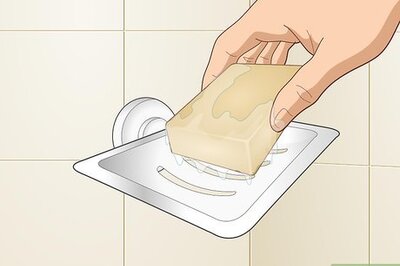
views
Washington: Barack Obama sealed the Democratic presidential nomination on Tuesday, a historic step toward his once-improbable goal of becoming the first black US president. A defeated Hillary Rodham Clinton maneuvered for the vice presidential spot on his ticket.
Obama's victory sets up a five-month campaign against Republican John McCain, a race between a 46-year-old opponent of the Iraq War and a 71-year-old former Vietnam prisoner of war and staunch supporter of the current US military mission.
They will vie to succeed President George W Bush, whose popularity has plummeted as the economy weakens, gasoline and food prices soar and the war continues in its sixth year.
Obama, a first-term Illinois senator who was virtually unknown across America four years ago, defeated Clinton, the former first lady and one-time campaign front-runner, in a 17-month marathon for the Democratic nomination.
''Tonight, I can stand before you and say that I will be the Democratic nominee for president of the United States,'' he said, in remarks prepared for delivery at a rally in St Paul, Minnesota.
His victory had been widely assumed for weeks. But Clinton's declaration of interest in becoming his running mate was unexpected.
The New York senator expressed it in a conference call with the congressional delegation from her state after congresswoman Nydia Velazquez predicted Obama would have great difficulty winning the support of Hispanics and other voting blocs unless Clinton was on the ticket.
''I am open to it'' if it would help the party's prospects in November, Hillary replied, according to a participant who spoke on condition of anonymity because the call was private.
Hillary's comments raised anew the prospect of what many Democrats have called a ''Dream Ticket'' that would put a black man and a woman on the same ballot, but Obama's aides were non-committal.
''We're not in the presidential phase here. We're going to close out the nominating fight and then we'll consider that,'' David Axelrod, Obama's top strategist, told reporters aboard the candidate's plane en route to Minnesota.
The fast-paced developments unfolded as the long Democratic nominating struggle ended with Clinton winning a primary in South Dakota and Montana yet to be settled.
Only 31 delegates were at stake Tuesday, the final few among the thousands that were once up for grabs among Obama, Clinton and six other Democratic candidates at the start of the campaign.
With his appearance in St Paul, Obama was sending McCain an unmistakable message by claiming his victory in the arena where the Arizona senator will accept his party's nomination in September.
Hillary was in New York for an appearance before her supporters. She said she would make no announcement about her plans.
Hillary praised Obama, whom she said ''has inspired so many Americans to care about politics and empowered so many more to get involved. And our party and our democracy is stronger and more vibrant as a result.''
With the race down to two candidates, Obama and McCain promptly exchanged criticism over the war in Iraq and sought to claim the mantle of change in a country plainly tired of the status quo.
''It's not change when John McCain decided to stand with George Bush 95 per cent of the time, as he did in the Senate last year,'' Obama said in his remarks prepared for delivery in St. Paul.
Speaking to supporters in New Orleans, McCain agreed with Obama that the presidential race would focus on change. ''But the choice is between the right change and the wrong change, between going forward and going backward,'' he said.
Obama had been on the verge of securing the 2,118 delegates needed to win the nomination heading into Tuesday's primaries. But even before polls closed, it was clear he had sealed his victory as 22 elected delegates and ''superdelegates'' - party officials and elected leaders who can vote as they please - privately confirmed their intentions to The Associated Press. Obama had 2,129 delegates by the AP count.
PAGE_BREAK
The young senator's success amounted to a victory of hope over experience, earned across an enervating 56 primaries and caucuses in US states and overseas territories that tested the political skills and human endurance of all involved.
Together, Obama and Clinton drew record turnouts in primary after primary - more than 34 million voters in all, independents and Republicans as well as Democrats.
Yet the race between a black man and a woman exposed deep racial and gender divisions within the party.
Obama drew strength from blacks, and from the younger, more liberal and wealthier voters in many states. Clinton was preferred by older, more downscale voters, and women.
Obama's weakness with Hispanic and white working class voters could be a serious vulnerability in the November election, especially in industrial states that are crucial to Democratic hopes.
But Obama has demonstrated his political strength through his prodigious fund-raising, meticulous organizing and his theme of change aimed at an electorate opposed to the Iraq war and worried about the economy - all harnessed to his own gifts as an inspirational speaker.
With the peace and prosperity of husband Bill Clinton's presidency as a backdrop, Hillary campaigned for months as the candidate of experience, a former first lady and second-term senator ready, she said, to take over on Day One.
As the strongest female presidential candidate in US history, Hillary drew large, enthusiastic audiences. Yet Obama's were bigger still. One audience, in Dallas, famously cheered when he blew his nose on stage; a crowd of 75,000 turned out in Portland, Oregon, the weekend before the state's May 20 primary.
Obama won a stunning victory in the first contest, the Iowa caucuses in January. Clinton came back with an upset five days later in New Hampshire that set the stage for a campaign marathon as competitive as any in the United States in the last generation.
They traded victories through the ''Super Tuesday'' contests on Feb. 5, when almost half the states voted. Then Obama had 11 straight victories and the Clinton campaign never fully recovered.
Clinton saved her candidacy once more with primary victories in Ohio and Texas on March 4, beginning a stretch in which she won in six of the next nine states on the calendar, as well as in Puerto Rico.
It was a strong run, providing glimpses of what might have been for the one-time front-runner.
Personality issues rose and receded through the campaign:
Hillary's husband, the former president, campaigned tirelessly for her but sometimes became an issue himself, to her detriment.
And Obama struggled to minimize the damage caused by the incendiary rhetoric of his former pastor in Chicago, the Rev Jeremiah Wright, an issue likely to be raised anew by Republicans in the general election campaign.


















Comments
0 comment